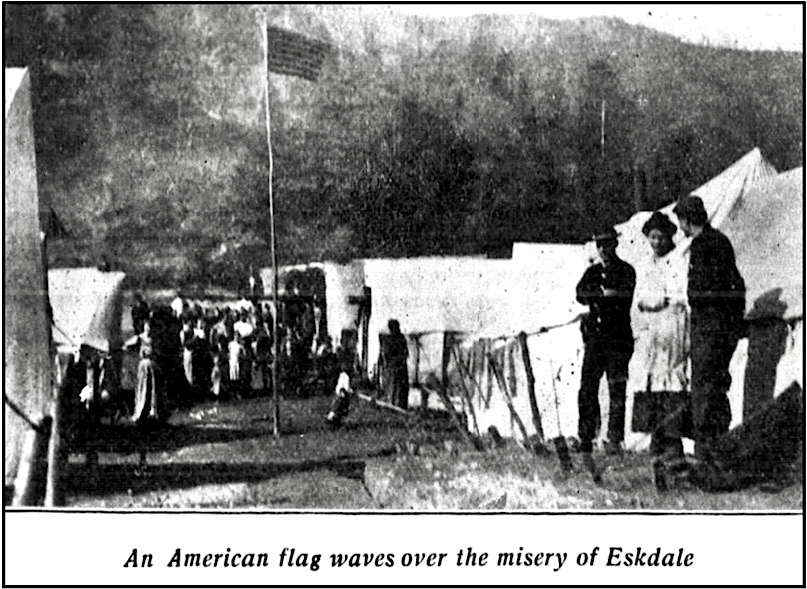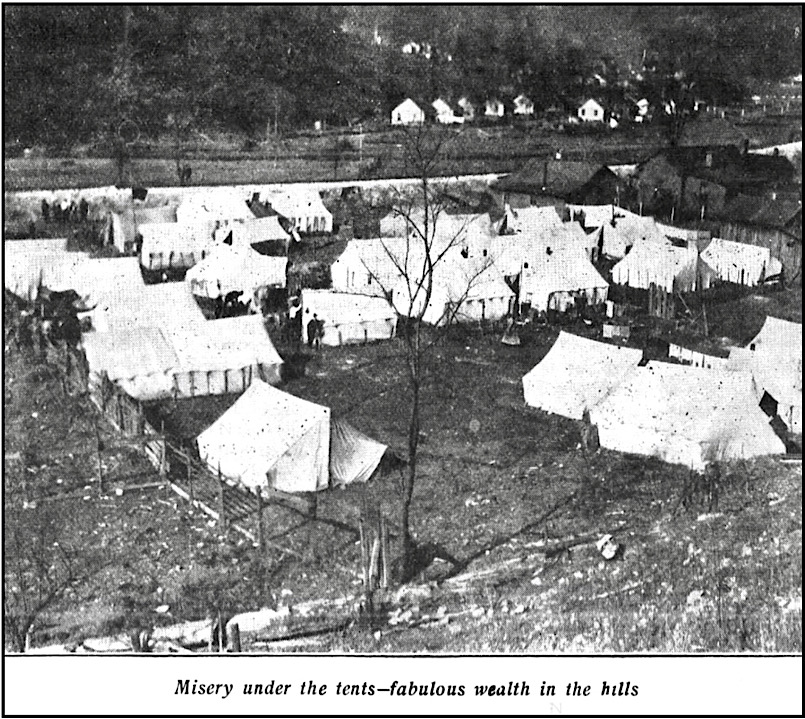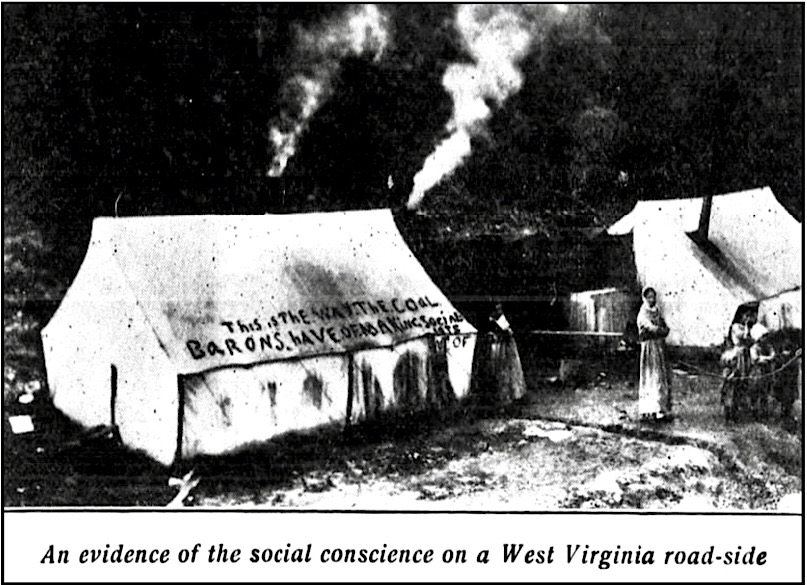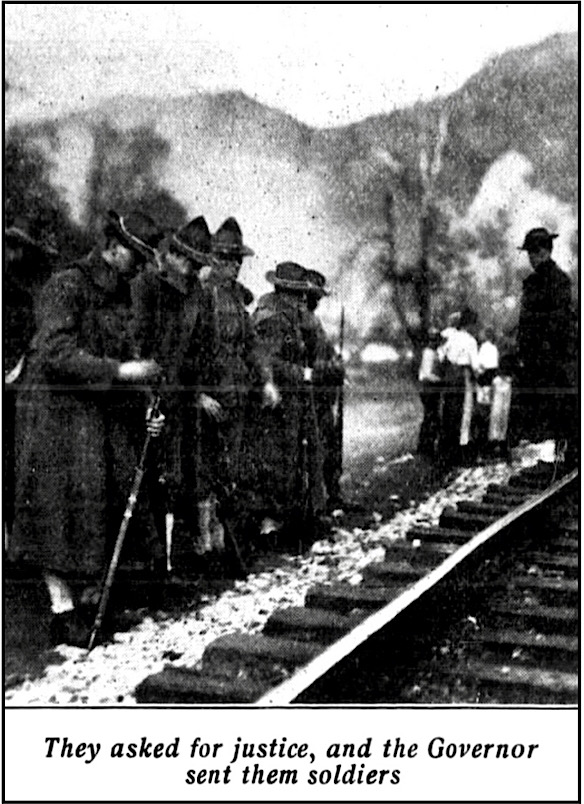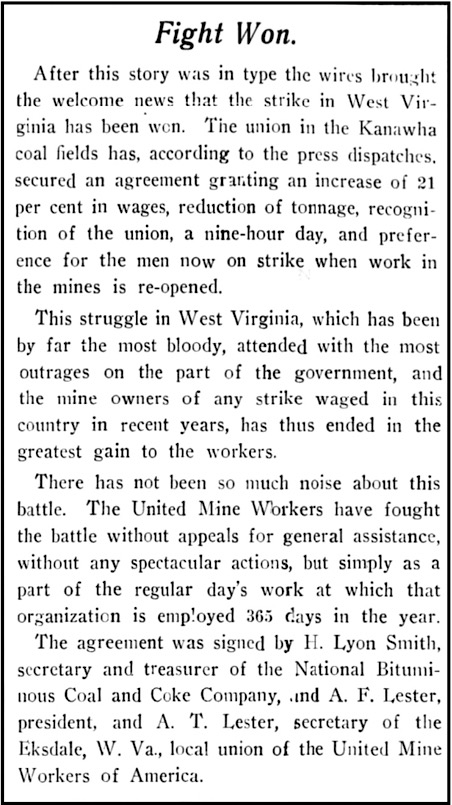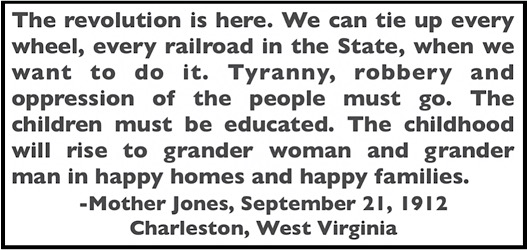 —————
—————
Hellraisers Journal – Monday December 23, 1912
American Flag Stands Tall Over Miners’ Tent Colony at Eskdale, West Virginia
From The Coming Nation of December 7, 1912:
Winning the Fight at Eskdale
———-By Alfred Segal
———-
THERE was a tremendous excitement in the little village of Eskdale, W. Va.
An American flag waves over the main street of Eskdale (perhaps to give assurance that Eskdale is really in America and not in Russia); but on the same street you see little children barefoot, now in November, because they haven’t any shoes, and you see the families of striking miners, evicted and driven into the highways by the Coal Dukes, living under tents because they have no homes. You are ashamed to enjoy the meager comforts of your hotel room after you have lived a day with the misery of Eskdale.
Two rods from the tents stand the coal hills with their fabulous wealth-the fine tables set by nature for all her children and yet within sight of the feast they are starving.
Well, the heart of Eskdale was beating like a trip-hammer. Word had come down through the hills that the governor had declared martial law over the strike district and that the soldiers were coming.
The echoes of gun-shots were rolling down into the valley. They came into Eskdale like the rumble of cannon. Somewhere up in the hills there was another battle on between miners and mine guards-one of those fights that make the quickly-dug, rude graves that you can find in lonely places in the coal hills.
Oh, yes, it’s lawlessness all right. But you can see it and hear it and some people can understand it. For years and years West Virginia has been ruled by respectable, invisible lawlessness which controlled courts, ran the legislatures and elected United States senators and is now responsible for the barefoot little children and the homeless exiles in the tents.
The soldiers were coming.
It runs through Eskdale’s mind that what it wants is a living wage, justice and fair-dealing and here the governor was sending the soldiers.
The shot echoes crashed without pause down the valley, waking sleeping babies under the tents and arousing strange stirrings in the hearts of the men and women of Eskdale, needing bread, but hungering only for freedom.
And then the distant toot of the engine which was pulling the martial law special and the soldiers, broke upon the village. Eskdale crowded to the railroad track. The train rumbled past toward the depot.
In the first car were the soldiers, guns held firmly in front of them, ready for work.
And in the second car-
“Scab, scab,” cried a boy, shrill-voiced.
He pointed at a window in the second car-at a face, soiled, weary-eyed, unshaven, crowned with a battered hat. And behind this face there was another and another-a whole car-load of such faces.
“Scab, scab”-the men and women took up the cry. They could not understand that these men were like themselves the dupes of the system.
Martial law had come into the strike zone with a shipment of strike-breakers whom it was protecting, with orders to shoot to kill if one of them was molested. The state of West Virginia had become a strike-breaking agency.
And to the inhabitants of its hills, the state had given so little protection through all these years. They had asked for laws that would emancipate them from the tyranny of the mine guard system-and had been denied. They had asked for compensation laws that would protect their families against the consequences of fatal accident in the mines-and had been denied.
And here were the strike-breakers come to take their jobs and to live upon their hills under protection of their militia.
“Scab, scab,” they jeered.
[Hunger Squad Pitched Against Hunger Squad]
I was there and spoke to the strike-breakers-men and boys recruited from the hunger squads of the East Side of New York, none of them miners, weary with the futile search for work at their trades, and desperate enough to throw themselves at adventure as strike-breakers for the sake of a job.
The despair of hunger, you see, knows no state lines. It recruits the strike-breaker in New York. It scourges to violence the striking miner of West Virginia. Hunger squad is pitched against hunger squad.
There is alignment in the industrial warfare in the Kanawha coal region of Virginia: Strike-breakers who are workers and militiamen who are workers vs. miners who are workers.
Greed is very well pleased with the spectacle.
Eskdale is but one of the many villages in which the striking miners and their wives and children are bivouaced in their tents for the miner’s struggle. If they can endure cold as they have endured the bludgeon blows of mine guards, they can win.
But they are so ill-equipped for the struggle.
In these hills, put there for everybody (what strange doctrine) is stored the power that moves woolen mills and cotton mills and shoe factories and lumber mills, but under the tents close by, live little children who are barefoot and ragged and who have not even the shelter of a roof.
The strong few have gorged themselves on the everlasting banquet that is spread out here, while the many at the foot of the hills have gotten only the crumbs. Last May the miners asked for a few more crumbs.
“More crumbs do you want?” thundered the Coal Dukes of the hills. “Either you take what you got or you get none at all.”
And that’s the reason for the strike. That is why men and women and children, driven from their homes into the highways by the Coal Dukes, wait under their tents with tragic resignation for the hardships of the winter; that’s why men, embittered, have been impelled to lawlessness; that’s the reason for those rude, lonely graves on the hillsides whose occupants are mine guards hired by the Coal Dukes to keep intruders from their feast.
It is a matter of record, contained in the stenographic report of the investigation recently made by a state commission, that women have been beaten by mine guards, that babies were born on the roadsides after their mothers had been evicted from their homes and driven on and on at the point of mine guards’ guns; that one baby was born dead after its mother had fled in terror from her home through which mine guards had fired shots; that mine foreman was discharged because his wife had given shelter to the wife of a miner whom mine guards had evicted.
When the miner of West Virginia awoke to a vague class consciousness last May, he saw for the first time how he had been tricked and cheated; he looked around his home, owned by the company, and noticed its squalor for the first time; he gazed upon the hunger-marked faces of his children.
And so he struck out and his blow hit the mine guard, the nearest representative of the system.
But last week, I was traveling through the strike district. The train stopped at a place called Ohley-a deserted village. The evicted inhabitants had pitched their tents on free ground on the other side of the road.
Across the top of one of the tents a rude sign had been painted. And these were the words on the sign:
“This is the way the Coal Barons have of making Socialists of us.”
The miner has seen that the mine guard is but a very small wheel in the system and he has indicated that he has received a glimpse of the vision by electing in the strike district on November 5, two Socialist justices of the peace, two Socialist constables and one Socialist member of the board of education.
The Socialist majorities approximated 1,100 votes. A mine operator who is a Bull Moose candidate for United States senator complained to me concerning the ingratitude of mine workers. He conducts what is known as the model mine of West Virginia, his plant is unionized and he dabbles in social service.
“And yet,” said this man, “after I had asked them to vote for Roosevelt, ninety-seven of them voted for Debs and only twenty-four for Roosevelt.”
And that is where the mine worker has made another step toward freedom. It was testified in the state’s investigation that miners lost their jobs when they failed to vote as they were told by the superintendent. They have now freed themselves of fear and vote as they please.
Fearlessly, also, they are guarding their homes-if home can be in a wretched tent. Babies are playing with bullets-the toys in the kindergarten that greed has established in the hills. They are long, sharp bullets that fit into the guns their fathers keep in their tents.
Every train brings in soldiers-and strike-breakers. And every train going out of the strike-regions carries strike-breakers, fleeing from the mine-traps to which they have been lured by false promises of high wages.
Many of them penniless, are walking the roads to the cities, fed as they tramp by the impoverished folks in the tents.
One day, one hundred of the refugees crowded Charleston, the capital, homeless, penniless and hungry. And the state which was willing to protect them with its full military authority when they were “breaking the strike,” had nothing for them now. A very peculiar phenomenon: Even the strikebreakers are striking against Greed in West Virginia.
[Emphasis added.]
~~~~~~~~~~~~~~~~~~~~~~~~~
SOURCES & IMAGES
Quote Mother Jones, Revolution Is Here
-Speech Cton WV, Sept 21, 1912, Steel Speeches p116
https://digital.library.pitt.edu/islandora/object/pitt%3A31735035254105/viewer#page/138/mode/2up
The Coming Nation
(Girard, Kansas)
-Dec 7, 1912
https://www.newspapers.com/image/488969788/
https://www.newspapers.com/image/488969800/
See also:
Nov 23, 1912, Richmond VA Times Dispatch
-Striking Miners of UMW Local Eskdale WV Sign Agreement
https://www.newspapers.com/clip/115072949/nov-23-1912-richmond-va-times/
Conditions in the Paint Creek district, West Virginia.
Hearings before a subcommittee of the Committee on Education and Labor, United States Senate, Sixty-third Congress, first session, pursuant to S. res. 37, a resolution authorizing the appointment of a committee to make an investigation of conditions in the Paint Creek district, West Virginia [June 2-Oct. 29, 1913]
https://catalog.hathitrust.org/Record/008606894
(search Vol 1: eskdale)
https://babel.hathitrust.org/cgi/pt/search?id=nyp.33433004194795;q1=eskdale;sz=25;start=1;sort=seq;hl=true;page=search;seq=1;orient=0
(search Vol’s 2 & 3: eskdale)
https://babel.hathitrust.org/cgi/pt/search?id=nyp.33433004194787&q1=eskdale&sz=25&start=1&sort=seq&hl=true
Working Class Radicals
The Socialist Party in West Virginia, 1898-1920
-by Frederick A. Barkey
West Virginia University Press, 2012
(see index p265: Eskdale)
https://books.google.com/books?id=bcf-ygAACAAJ
Wikimedia Commons File:
Mother Jones rallying the miners at Eskdale at July 1, 1912
Note: source makes claim w/o any real proof; unable to verify.
https://commons.wikimedia.org/wiki/File:Mother_Jones_rallying_the_miners_at_Eskdale.png
Eskdale WV
https://weneverforget.org/tag/eskdale-wv/
Tag: Paint Creek-Cabin Creek Strike of 1912-1913
https://weneverforget.org/tag/paint-creek-cabin-creek-strike-of-1912-1913/
~~~~~~~~~~~~~~~~~~~~~~~~~
Tom Morello – Hold the Line

